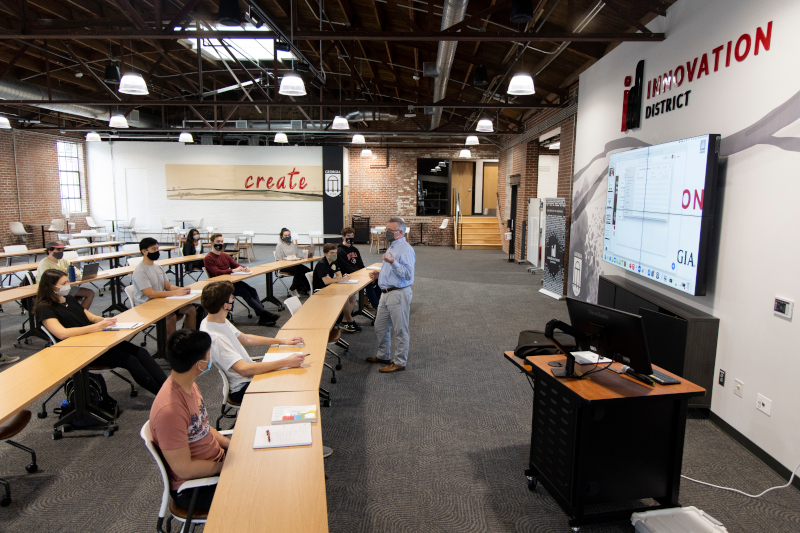If the world worked as it does in a textbook or a pop quiz, things might seem pretty unambiguous—with each and every problem having a specific answer.
While taking the first course in University of Georgia’s brand new Student Industry Fellows Program, fifth-year student Andrew Romanick came to fully realize, “There is usually more than one solution to a problem.”
Romanick, a mechanical engineering major, was looking into a design class when he learned about IDEA 4000, UGA’s inaugural class in the new Student Industry Fellows Program.
The program, supported by funding from The Delta Air Lines Foundation, brings students together from a range of disciplines to solve new and pressing industry-related challenges.
“This class has been amazing in helping me understand the problem-solving design process and how it applies to real-world issues,” said Romanick, who is also pursuing an Entrepreneurship Certificate. “It was awesome to work with people outside of my discipline who brought their unique knowledge to our small group work.”
Real-world ready
IDEA 4000 is taught by Andrew Potter, UGA’s director of experiential learning and a former industry executive.
In that latter role, Potter said, “I saw firsthand the need for recent college graduates to gain practical experience in applying critical thinking, collaboration, communication and creativity skills across the innovation and entrepreneurship ecosystem.”
The Student Industry Fellows Program offers hands-on skill development in market research, business modeling, customer segmentation, product prototyping and early-stage development. Courses are taught at the new Innovation Hub building, which opened in January as the latest part of UGA’s Innovation District.
The first course in the fellows program introduces students to design frameworks and has them take on three unique design challenges. As part of a small group, students have to think through a problem, develop a solution, and then present ideas to the class.
Laurel Mitelman, a fourth-year advertising major, said, “My small group was made up of a consumer journalism, management and an economics major. It was valuable to collaborate and bring our different strengths to the table to solve the problem.”
Aside from simulating the workplace’s diversity, Mitelman found that she could apply some classroom skills immediately.
“I have been interviewing for jobs this past month in preparation for graduating in May and used the more formal presentation skills I acquired in this class to help me through the process,” Mitelman said.
Not knowing exactly what to expect when he enrolled, sophomore Christopher Rosselot, international affairs and Latin American Caribbean studies double major, was drawn to the course description that promised to deliver hands-on problem-solving exercises.
“It has taught me how-to apply skill-based learning to solve large, complex problems that seem insurmountable,” said Rosselot. “I have learned that you can tackle big challenges and solve them in realistic ways.”
What comes next
The second part of the program begins this fall and will bring students and industry partners together to take on research and design quandaries. Students will have the opportunity to marry their academic background with the innovation frameworks and work on a real problem at a real company.
Potter said, “The Student Industry Fellows Program is not simply about equipping and empowering students. The program builds a talent pipeline between communities, government, industry, students, faculty, and facilities at the University of Georgia. Ultimately, the program brings students from a range of disciplines to solve emergent and pressing challenges for their communities and the state of Georgia.”





